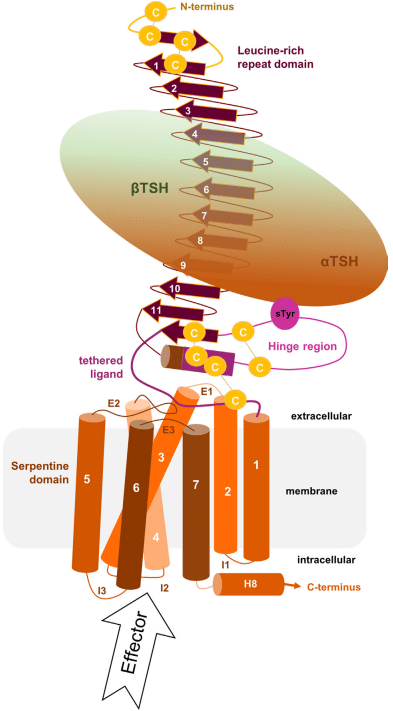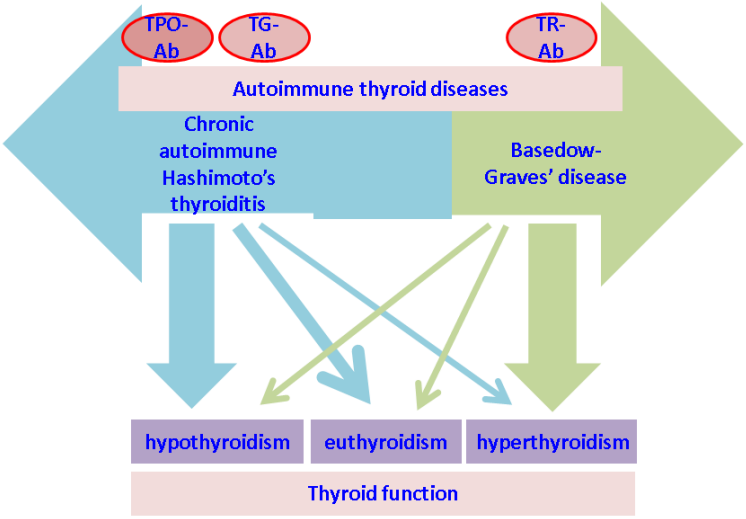NAA Services for Anti-TSH Receptor
Autoimmune thyroid diseases are the more prevalent organ-specific autoimmune disorders in humans and share common immunologic markers, including circulating anti-thyroid antibodies. Natural autoantibodies (NAAs) against the thyroid-stimulating hormone receptor (TSHR antibodies, TSHR-Ab) have been associated with thyroiditis. As a long-term expert in NAA research, Creative Biolabs owns lots of scientists who are proficient in NAA detection and analysis. At present, our professional scientists are pleased to provide the custom services against novel biomarkers TSHR of thyroiditis.
Background of Anti-TSH Receptor Antibody
TSHR, expressed on the cell surface of thyrocytes, initiates the major signals that regulate thyroid cell growth and hormone synthesis/secretion. TSHR is an autoantigen in Graves’ disease (GD) and Hashimoto's thyroiditis (HT), where TSHR-Abs induce thyroid growth and hyperthyroidism and represent an important diagnostic hallmark. Three types of TSHR-Abs are recognized, stimulating (S-TRAbs, IgG1 class), blocking (B-TRAbs), and “neutral” (neutral TRAbs) autoantibodies. Indeed, contrary to the other anti-thyroid antibodies like anti-thyroperoxidase, anti-thyroglobulin, and anti-sodium/iodide symporter antibodies, TSHR-Ab are pathogenic, capable of activating or blocking TSHR functions. Detection of TSHR-Ab by different assays is largely requested in clinical practice for the diagnosis of thyroiditis and the differentiation from diffuse thyroid autonomy.
 Fig.1 Overall thyroid-stimulating hormone receptor (TSHR) protein structure.1
Fig.1 Overall thyroid-stimulating hormone receptor (TSHR) protein structure.1
The Role of Anti-TSH Receptor Antibody in Thyroiditis
Autoimmune thyroid disease consists of two opposing clinical syndromes, GD and HT. TSHR-Abs are found in 90% of GD patients, 0-20% of HT patients, and 10-75% of atrophic thyroiditis patients. The hyperthyroidism in GD patients is caused by stimulating the function of TSHR, resulting from the production of agonist antibodies to the receptor. TSHR-Ab is pathophysiologic and clinical indicators of thyroiditis. The detection of TSHR-Ab is useful for diagnostic and management purposes. In addition, more sensitive TSHR-Ab assays may increase their significance in the diagnosis and management of autoimmune thyroid diseases.
 Fig.2 The relationship between thyroid hormonal profile and thyroid autoimmunity: TSH-receptor antibody (TR-Ab).2
Fig.2 The relationship between thyroid hormonal profile and thyroid autoimmunity: TSH-receptor antibody (TR-Ab).2
What We Can Do about NAA?
With abundant experience in NAA projects, Creative Biolabs is able to provide a full range of NAA services for thyroiditis's diagnosis and monitoring. Our NAA service can cover every step of your program, from NAA detection, NAA profiling, to NAA epitope mapping. In addition, the largest portfolio of NAA products is also available for your choice.
Features of Our Anti-TSHR Services Including But Not Limited to
- Different NAA detection methods with high accuracy and sensitivity
- One-stop pipeline to save your time and energy
- High efficiency without large-scale repeated trials
- Best after-sale service to ravel out your concerns
Based on the theoretical basis that pathogenic antibodies could be viewed as the ideal marker for the diagnosis and management of the corresponding autoimmune disease, Creative Biolabs has been engaged in the research of disease diagnosis and corresponding NAA analysis. With abundant experience in NAA projects, Creative Biolabs is able to provide a full range of anti-TSHR marker services for thyroiditis monitoring. Our professional team is optimized to help you with high-quality and cost-effective service to make your project a success. Please contact us for more information.
References
- Kleinau, Gunnar, et al. "Structural–functional features of the thyrotropin receptor: a class A G-protein-coupled receptor at work." Frontiers in endocrinology 8 (2017): 86.
- Popa, Adelina, et al. "Study of the thyroid profile of patients with alopecia." Journal of Clinical Medicine 12.3 (2023): 1115.
Related Services:
- NAA Services for Anti-TPO Antibodies
- NAA Services for Anti-Thyroglobulin Antibody
- NAA Services for Anti-Na+/I- Symporter Antibody

